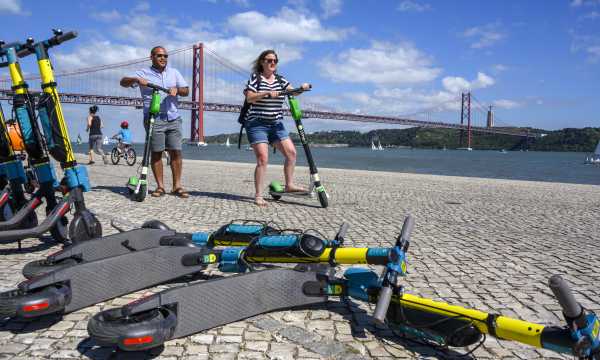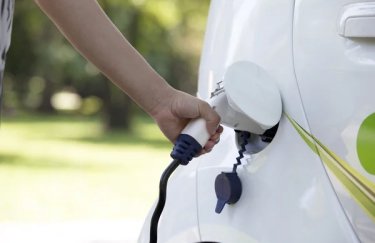
This story is part of a group of stories called

Finding the best ways to do good. Made possible by The Rockefeller Foundation.
Companies like Bird and Lime have been selling us a promise about their electric scooters: They’re great for the planet! For the most part, we’ve enthusiastically embraced this notion, and it’s helped catapult scooters into popularity. Last year, riders took about 38.5 million trips on them.
But it might be time to question the climate-friendly narrative. Just because the scooters themselves don’t spew out carbon dioxide, doesn’t mean the process of making, charging, and transporting them is emission-free.
In fact, on the whole, scooters are worse for the environment than the modes of transportation they’re replacing, according to a new study published in the peer-reviewed journal Environmental Research Letters.
Researchers at North Carolina State University set out to determine how much harm to the climate results from each portion of a scooter’s “life cycle.” They found that most of the harm comes from manufacturing the device, which is typically done in China, and from transporting it around a city, which is typically done by — you guessed it — cars.
Each night, after we’ve parked our scooters on the curb, the companies behind them pay contractors (known as “Juicers” or “Chargers”) to drive around the city and gather them, transport them to be charged, and then reposition them in places where they’ll likely be picked up in the morning.
The researchers tallied up the greenhouse gas emissions used in making and moving the scooters around, as well as the relatively small amount of emissions that comes from shipping the materials from China to the US and from charging the scooters. They used all that information to calculate the total emissions per passenger mile. Then they compared that to the emissions per passenger mile produced by other modes of transportation.
The result: Scooters typically produce more emissions than a standard bus with high ridership, an electric moped, an electric bicycle, a regular bicycle, or a good old carbon-free walk.
The researchers also note some important survey results from Raleigh, North Carolina. If there were no scooter option available, almost half of scooter riders say they would have biked or walked instead. Both of those are more climate-friendly alternatives. Another 11 percent would’ve hopped on the bus — also a greener option if it’s got high ridership, according to the study — and 7 percent would’ve not made the trip at all.
Only 34 percent say they would have used their own car or a service like Uber or Lyft.
So, assuming the findings are generalizable beyond North Carolina, the idea that giving people access to scooters means they’ll decrease their reliance on cars substantially — that is, substantially enough to make up for the climate impact of the scooters themselves — turns out to be false.
It’s worth noting that Lime announced last year that it would make efforts to green its fleet — for example, by buying renewable energy (it’s investing in both solar and wind). The company responded to the new study, saying, “We welcome research into the environmental benefits of new mobility options; however, this study is largely based on assumptions and incomplete data that produces high variability in the results. We believe micro-mobility will reduce pollution and mitigate climate change.”
However, the findings in the new study are consistent with previous research on scooters. It looks like the advent of scooters may actually be a net negative for the planet — at least, given the way we’re putting them to use right now.
How we can make scooters a legitimately green option
The study isn’t all doom and despair; it also highlights the green potential of scooters and includes recommendations for deploying them more efficiently.
First of all, as the study notes, “choosing an e-scooter over driving a personal automobile with a fuel efficiency of 26 miles per gallon results in a near universal decrease in global warming impacts.” In other words, scooting is definitely better than driving a car, and we shouldn’t lose sight of that basic fact. The question is whether we can get scooters to be better than buses, bikes, and other vehicles.
One big challenge is that scooters just don’t last long on the mean streets of, well, pretty much any American city. In theory, they’re built to last for two years, but that doesn’t account for all the people who throw them into rivers and lakes, light them on fire, drop them into garbage cans, or otherwise vandalize them. Sometimes people do this because they’re frustrated that scooters have invaded their streets; other times, they just want a stunt that’ll look cool on Instagram.
In any case, scooters now only last a month or two on the streets. That disposability is a problem for the climate, because it means scooter companies have to engage in more extraction of raw materials like aluminum, more shipping from China to the US, and so on.
Here’s another challenge: Several cities currently have policies in place that force companies to remove scooters from public areas at night. That means a lot of scooters are being collected and transported — by car — for recharging, even when they’re still 95 percent charged.
To combat these challenges, the study recommends that cities and companies make some changes, such as:
- Allow scooters to remain in public areas overnight, decreasing the driving burdens associated with picking up fully charged or nearly fully charged scooters
- Streamline the collection and redistribution process for scooters, so contractors aren’t wasting gas as they zigzag all around the city in their cars trying to find scooters
- Allow these contractors to “claim” certain scooters for collection to eliminate unnecessary and competitive driving
- Incentivize or require the use of efficient vehicles for collecting and redistributing the scooters
- Enact and enforce anti-vandalism policies to reduce scooter damage, which can result in short lifetimes for the vehicles and thus high materials and manufacturing burdens
If companies and cities make such changes, scooters have a hope of living up to their climate-friendly branding. And they can really become, as Umair Irfan wrote for Vox, “great news for urban transportation.”
But until we change the way scooters are deployed, the authors of the study say, “claims of environmental benefits from their use should be met with skepticism.”
Sign up for the Future Perfect newsletter. Twice a week, you’ll get a roundup of ideas and solutions for tackling our biggest challenges: improving public health, decreasing human and animal suffering, easing catastrophic risks, and — to put it simply — getting better at doing good.
Sourse: vox.com






